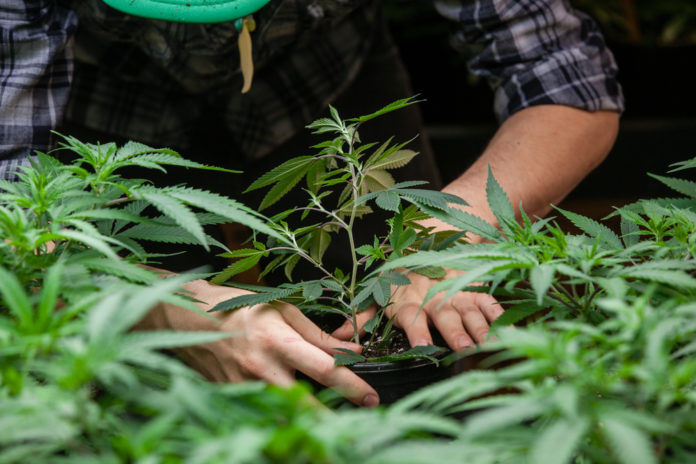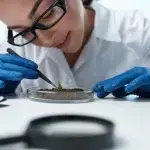Among cannabis growers there is serious disagreement surrounding the particulars of growing methods. The legal marijuana business is still getting its sea legs, and with so many subjective experiments being shared and discussed there are dozens of heated debates within the industry. Here are five of the hottest:
1) Outdoor or Greenhouse Production?
Indoor growing is how cannabis in the United States has traditionally been produced. This is largely due to the plant’s legal status. Growers were forced to negate traditional agricultural techniques in order to maintain secrecy and a low profile. As states legalize, traditional and practical growing practices have entered the cannabis cultivation arena, and indoor versus greenhouse growing is turning into one of the leading debates.
While indoor growers will swear by their high yields and potency, all signs show that the economics are slowly eliminating indoor growing’s commercial viability. Indoor growers require an insane amount of energy. To maintain a completely controlled environment with the absence of Mother Nature means artificial lighting, constant temperature control and monitoring ventilation, and all of this means exorbitant utility costs. In fact, legal cannabis production, even in its infancy, is one of the largest drains on energy in the entire country.
Compare this to greenhouse growing where growers are able to maintain complete environmental control – as well as high yields and potency – while drastically reducing the need for artificial environmental control, and growers are able to save money every month. As competition grows, the ability to maintain a low cost per gram is becoming increasingly important. Greenhouses are a clear way to reduce production costs and maintain a high-quality product.
While the debate will continue on, it does appear that in the future greenhouse production will be the norm.
2) Is It Organic?
Over the last decade or so, the term organic and the attempt to grow in a cleaner, greener way has become a prime topic amongst growers, doctors, food industry giants and marketing specialists. The debate between growers regarding organic or conventional methods has namely been dominated by concerns surrounding potency and flavor. However, there is a growing customer base seeking an organic product.
Medical Marijuana Business Daily conducted a study to find out what medical marijuana patients really want from their dispensaries and found that chemical sensitivities of patients results in a preference for non-chemical growing. In the future, organically labeled edibles may provide a significant advantage for some dispensaries over non-organic edibles at other dispensaries.
About 43 percent of medical marijuana customers in Colorado, California, and Washington favor organic marijuana. They prioritized organic methods over discounted pricing, which was considered critical to only 21 percent of the surveyed patients. While the scientific community navigates through the muddied waters of classifying what is and is not organic, recreational customers and patients are making choices that put their health above any other factor. The development of the organic market has cannabis growers thinking that organically produced cannabis may be a desired product for many patients and recreational users alike. Furthermore, with the development and success rate of edible sales, concerns held about food must essentially be applicable to the cannabis industry.
On top of the customers preferring an organic product, growers also have to face strict testing regulations. This has cut down on their ability to use pesticides and other chemicals. Many growers find it difficult to balance the customers’ needs and regulation requirements with their own business success. It is much easier – and cheaper – to maintain a commercial operation with the use of pesticides, chemicals, and other non-organic techniques.
In the current cultural climate, it’s difficult to imagine a decrease in interest for organic products, and it’s even harder to picture a world where cannabis regulations are reduced. Whether growers produce organic product or not appears to be in the hands of the customers and in part the regulatory committees.
3) LED or HPS Lighting?
Lighting has been a major debate since LED technology was introduced in the cannabis world. Every grower has their preference between LED and high-pressure sodium (HPS) lighting. This debate is another one that seems like it will be settled by the money. While some growers think that HPS lighting produces a superior crop and LED lighting creates undesirable buds, the fact is that after the initial cost, LED lighting is a smarter economic decision.
While HPS lighting may cost less up front, the reduction in utility costs is why many commercial growers choose LED lighting. To be fair to LED lighting, it has more to offer than just an economic advantage. Some growers also appreciate features like built-in cooling, which is easier to find in contemporary LED lighting, and LEDs can provide a customized color spectrum that allows growers to really fine tune their crop.
Some growers will always use HPS lighting, some will choose LED. This debate really comes down to personal preference mixed with the scale of production, and it will most likely be a hot debate for years to come.
4) Soil and Soilless Growing Media
“My soil mix grows superior bud.” While this isn’t a direct quote, every cannabis grower has either said this or heard it! It’s a common sentiment shared by a lot of growers. It’s hard to argue a grower staunchly invested in their super-secret soil mix, but that doesn’t stop the debate between growers who utilize soil and those who opt for the soilless route.
Using soil is a great way to naturally nourish plants, but there is no doubt that it requires more work. A lot of this debate breaks down to personal preference, and, again, choosing profitability through the reduction of labor.
Whether it’s hydroponics or rock wool and dripper stakes, soilless growing can be a great way to produce premium bud. Of course, these systems have to be well managed and the nutrient levels closely monitored, but the legitimate, labor-saving features make it extremely appealing to commercial growers.
When asked about soil versus soilless growing, Jerry Denny, the owner of 420 Growers and Processors, said, “I can’t explain it well enough. Hydroponics is so labor positive that it just makes my business. When I go from my grow room to my bloom room, I just pick up 18 plants at once, put them in place, plug them in and they’re done.”
It’s hard to argue with the grower who has the secret soil mix and it’s just as hard to argue with the commercial grower who says that soilless growing makes his business. This debate will rage on.
5) Seeds or Clones?
Seeds versus Clones, it sounds like a B-rated horror movie – in fact, navigating through this debate kind of feels like one. So let’s start with the facts. Both seeds and clones have their benefits and drawbacks. Seeds are preferred by growers, because they are starting with new tissue that will sprout a new plant. Seeds contain nutrients that go directly toward early plant strength and development. The gamble with seeds is that a seed can be male or female, in which case you will have to determine the sex of the plant and remove or kill all males before they pollinate the females, causing them to produce seeds instead of bountiful flower. Especially for new growers, seeds may be an easier choice for learning.
Growers may prefer clones, mostly because their sex is predictable. Clones are however slightly genetically weaker, which is why cloning second generation from a first generation clone may result in the loss of some of those desirable qualities from Mom. For researchers and industrial growers, clones are much less wasteful of resources. Many growers will clone their plants but buy new seeds every few cycles to restart the cloning process in order to maintain genetic strength in their daughter clones. If cloning correctly, then cloning is an easy choice to make for your production. Try to avoid buying clones, as regulation and trustworthiness are usually not guaranteed.
Regardless of where you stand in these discussions, the best thing to remember is that your experience and experiments that lead to personal success are valuable. You are responsible as a grower to decide and know your environment, your methods and your crop. Stay open-minded about further experiments as new work is done in the field. You never know how you may benefit from trying something new and sharing your evidence with others.
Visit www.GrowSpan.com for expert advice and information on greenhouse cultivation.











